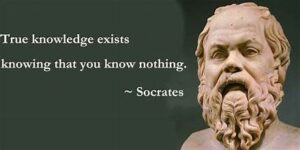
In the realm of philosophy, Socrates stands as a towering figure whose insights have transcended time. His teachings, deeply rooted in the art of questioning and self-reflection, offer valuable lessons for personal growth and success. This article explores the practical applications of Socrates’ timeless advice, demonstrating how his wisdom can be applied in contemporary life to foster personal development and achieve success.
Understanding Socrates: A Brief Overview
Socrates, a classical Greek philosopher who lived in Athens from 470/469 BC to 399 BC, is renowned for his contributions to ethics and epistemology. Unlike many philosophers of his time, Socrates did not leave behind written works. Instead, his ideas have been preserved through the dialogues of his students, most notably Plato. Socrates’ method of inquiry, known as the Socratic method, revolves around asking probing questions to stimulate critical thinking and illuminate ideas.
The Socratic Method: A Tool for Personal Growth
At the heart of Socrates’ philosophy is the Socratic method, a technique that involves asking a series of questions to challenge assumptions and encourage deeper understanding. This method is not just a philosophical tool but a practical approach to personal growth.
1. Questioning Assumptions
Socrates believed that questioning one’s beliefs and assumptions is crucial for personal development. By constantly challenging your own ideas, you can uncover underlying biases and gain a clearer perspective. For example, if you assume that success means achieving a high status or wealth, Socratic questioning can help you explore whether these goals align with your true values and desires.
Practical Application: Regularly engage in self-reflection by asking yourself questions such as, “Why do I hold this belief?” or “What evidence supports this idea?” This practice can lead to greater self-awareness and a more authentic path to success.
2. Embracing Uncertainty
Socrates famously claimed, “I know that I know nothing.” This acknowledgment of ignorance is not a defeatist attitude but a recognition of the limits of one’s knowledge. Embracing uncertainty allows you to remain open to new ideas and perspectives.
Practical Application: Cultivate a mindset that welcomes uncertainty and sees it as an opportunity for growth. When faced with challenges or unfamiliar situations, approach them with curiosity and a willingness to learn rather than clinging to fixed beliefs.
The Pursuit of Virtue: Socratic Values for Success
Socrates placed a strong emphasis on virtue as the foundation of a successful and fulfilling life. His views on virtue are not just abstract concepts but practical values that can guide personal and professional success.
1. Integrity and Honesty
For Socrates, integrity and honesty were essential components of virtue. He believed that living a virtuous life requires aligning your actions with your values and being truthful in your dealings with others.
Practical Application: Strive to maintain integrity and honesty in all aspects of your life. This means being transparent in your professional relationships, taking responsibility for your actions, and adhering to your core values even when it is challenging.
2. Wisdom and Self-Knowledge
Socrates’ famous dictum, “Know thyself,” highlights the importance of self-knowledge in achieving wisdom. Understanding your strengths, weaknesses, and motivations allows you to make informed decisions and pursue goals that align with your true self.
Practical Application: Engage in regular self-assessment to gain insights into your personal and professional strengths and areas for improvement. Use this knowledge to set realistic goals and make decisions that reflect your authentic self.
Socratic Dialogues: Enhancing Communication Skills
Socrates’ approach to dialogue involved engaging in thoughtful and respectful discussions to explore complex ideas. This method can enhance communication skills and foster constructive interactions.
1. Active Listening
Socrates emphasized the importance of listening to others’ viewpoints to gain a deeper understanding. Active listening involves fully concentrating on what the other person is saying without immediately formulating your response.
Practical Application: Practice active listening in your personal and professional interactions. By giving your full attention to others and seeking to understand their perspectives, you can build stronger relationships and improve your problem-solving abilities.
2. Constructive Dialogue
Engaging in constructive dialogue means discussing ideas openly and respectfully, even when there are disagreements. Socrates’ dialogues often involved exploring differing viewpoints to arrive at a deeper understanding.
Practical Application: Foster an environment of open communication in your personal and professional settings. Encourage discussions that explore various perspectives and focus on finding common ground rather than winning arguments.
Applying Socratic Wisdom to Modern Challenges
In today’s fast-paced world, Socratic wisdom offers practical guidance for navigating various challenges and achieving personal success.
1. Decision-Making
Socrates’ emphasis on critical thinking and self-reflection can enhance decision-making processes. By questioning your motivations and considering various perspectives, you can make more informed and thoughtful decisions.
Practical Application: When faced with important decisions, use the Socratic method to evaluate your options critically. Ask questions such as, “What are the potential consequences of this decision?” and “How does this choice align with my long-term goals?”
2. Personal and Professional Development
Socrates’ teachings on virtue and self-knowledge can guide personal and professional development. By focusing on continuous improvement and aligning your actions with your values, you can achieve meaningful growth and success.
Practical Application: Set personal and professional development goals based on Socratic principles. Regularly assess your progress, seek feedback from others, and make adjustments to ensure that your actions are consistent with your core values and aspirations.
Conclusion
Socrates’ timeless advice continues to offer valuable insights for personal growth and success. By embracing the Socratic method, prioritizing virtue, enhancing communication skills, and applying Socratic wisdom to modern challenges, you can navigate life’s complexities with greater clarity and purpose. Socrates’ legacy reminds us that the pursuit of knowledge, integrity, and self-awareness is a lifelong journey that can lead to a more fulfilling and successful life.

